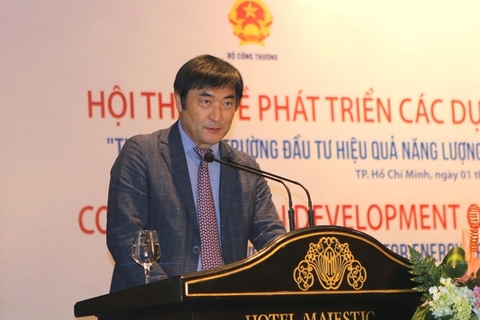
Kim Jinoh, country director of KOICA in Viet Nam, speaks at a conference on Development of Energy Efficiency Projects within the framework of the ‘Promoting Investment Market for Energy Efficiency in Industrial Sector in Viet Nam’ project in HCM City on October 1. — VNA/VNS Photo
To meet its growing demand for energy, Viet Nam, besides exploiting new energy sources, particularly clean energy, needs to further improve energy saving and efficiency, a conference heard in HCM City yesterday.
Speaking at the conference titled Development of Energy Efficiency Projects, Nguyen Thi Lam Giang, director general of the Department of Energy Efficiency and Sustainable Development, said with rapid economic growth Viet Nam’s electricity demand was increasing rapidly.
Aware of the importance of energy saving, the country had implemented the Viet Nam National Energy Efficiency Programme (VNEEP) and achieved encouraging results, she said.
Phase 1 in 2006-10 and phase 2 in 2012-15 helped saved 3-4 per cent and 5.65 per cent, equivalent to 4.9 million and 11.2 million tonnes of oil, she said.
Under VNEEP 3 in 2019-30, approved last March, Viet Nam planned to reduce energy consumption by 5-7 per cent in 2019-25 and 8-10 per cent in 2019-30, she said.
“In addition to [local] efforts, the Vietnamese Government also receives support from many countries and non-governmental organisations to achieve the targets.
“The ‘Promoting Investment Market for Energy Efficiency in Industrial Sector in Viet Nam’ project is part of the co-operation between the governments of Viet Nam and South Korea to help Viet Nam implement the VNEEP3 programme and its sustainable development goals.”
Funded by the Korean Government through the Korea International Cooperation Agency (KOICA), the project seeks to eliminate identified barriers to promote the development of energy services companies and create a conducive environment for implementing energy efficiency investment projects, reducing greenhouse gas emissions and protecting the environment.
Being implemented between December 2017 and December 2019, the project consists of three main components: building capacity for investment projects in energy saving and efficiency in the industrial sector, identifying energy saving and efficiency investment projects in the industrial sector and assisting the implementation of investment projects.
Kim Jinoh, country director of KOICA in Viet Nam, praised Viet Nam’s efforts to improve energy efficiency.
“The first and second phases of the VNEEP yielded certain results. The programme’s third phase has just started and will go on until 2030. KOICA wants to contribute to Viet Nam achieving its energy saving and efficiency targets.
“The conference aims to share knowledge and experience related to energy efficiency through the market mechanism, more importantly, useful information about financing sources and methods to identify energy efficiency projects.”
Kim Youngjun, project co-ordinator, said through analysis of energy-saving technologies used at 2,409 enterprises in the list of designated energy users, the project selected 10 industrial sites to conduct an energy audit under the supervision of South Korean experts.
Through the audits, experts proposed 108 energy-efficiency solutions, he said.
Implementing these solutions could save companies US$78,000 a year and reduce 606,000 tonnes of carbon dioxide emissions annually, Giang said.
Since they are estimated to cost around $200,000, the payback period is 2.6 years, according to Giang. — VNS